We are very excited to move forward with safety requirements to send Astronematode to ISS NL. Here are some of the samples we are preparing for safety tests.
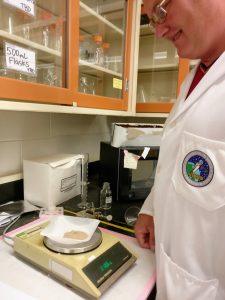
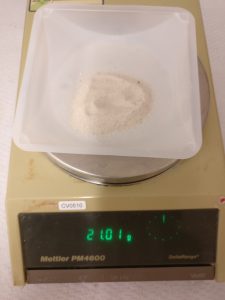
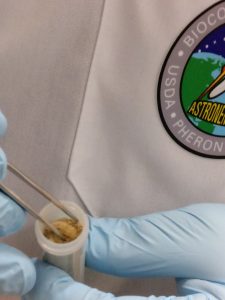
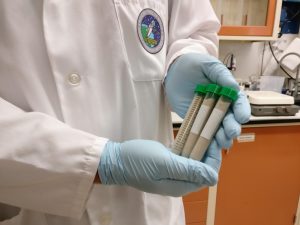
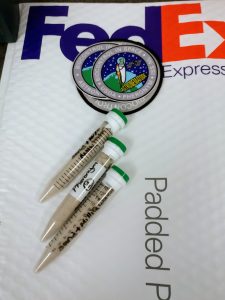
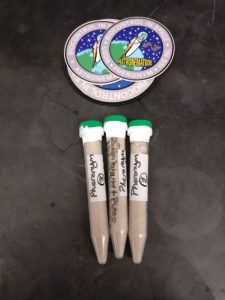

Nematode Pheromones
We are very excited to move forward with safety requirements to send Astronematode to ISS NL. Here are some of the samples we are preparing for safety tests.






By Sandra Avant, July 25, 2019
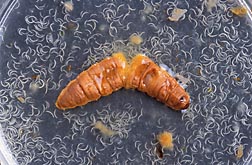 A recent Agricultural Research Service (ARS) study, published in The Journal of Invertebrate Pathology, shows that beneficial nematodes (also called entomopathogenic nematodes) treated with pheromone extracts are more effective at killing an economically important insect—the pecan weevil—as well as the black soldier fly.
A recent Agricultural Research Service (ARS) study, published in The Journal of Invertebrate Pathology, shows that beneficial nematodes (also called entomopathogenic nematodes) treated with pheromone extracts are more effective at killing an economically important insect—the pecan weevil—as well as the black soldier fly.
The pecan weevil is a major pecan pest in the Southeast as well as in Texas and Oklahoma, said David Shapiro-Ilan, an entomologist at the ARS Southeastern Fruit and Tree Nut Research Laboratory in Byron, Georgia. If left uncontrolled, it can reduce crop production up to 70 percent.
An advantage of using beneficial nematodes is that they are safe for humans and the environment and target only specific insects, Shapiro-Ilan said.
In earlier research, Shapiro-Ilan and his colleagues discovered that pheromones produced by beneficial nematodes direct their behavior—telling them to disperse or infect insects. With that in mind, they sought ways to use pheromones to enhance nematodes’ behavior to kill more insect pests.
Since then, ARS has established a cooperative research agreement with Pheronym, an ag-biotech pest control company that develops and produces nematode pheromones that can be used to direct beneficial nematode behavior. Keep Reading
It is also featured at:
Honored to be invited by the students of the UC Davis Department of Plant Pathology to Industry seminar series on Wednesday, May 29, 2019.
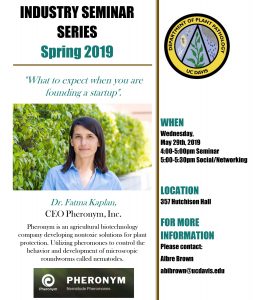
Come and talk to me tomorrow at 4 PM.
Peer-reviewed Study Supports Pheronym’s Approach to Nematode Bio-remediation as Economical and Effective for Commercial Deployment
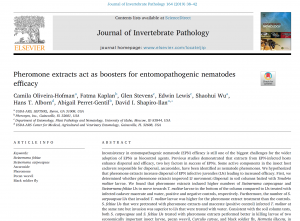 DAVIS, CA – May 14, 2019 – Pheronym, an ag-biotech pest control company, announced today the results of a study supporting the commercial efficacy of their breakthrough bio-remediation technology. In tests, commercially available beneficial nematodes exposed to their patented Nemastim™ pheromone extracts were 28% – 78% more effective controlling pecan weevils and black soldier flies than non-exposed nematodes. The research, led by Dr. David Shapiro-Ilan, an entomologist with the USDA-Agricultural Research Service, along with ARS research associate Dr. Oliveira-Hofman, and co-authored by Dr. Ed Lewis, head of the Department of Entomology, Plant Pathology and Nematology at the University of Idaho, is currently featured in “The Journal of Invertebrate Pathology, Volume 164” and can be accessed through “Science Direct” at https://doi.org/10.1016/j.jip.2019.04.008.
DAVIS, CA – May 14, 2019 – Pheronym, an ag-biotech pest control company, announced today the results of a study supporting the commercial efficacy of their breakthrough bio-remediation technology. In tests, commercially available beneficial nematodes exposed to their patented Nemastim™ pheromone extracts were 28% – 78% more effective controlling pecan weevils and black soldier flies than non-exposed nematodes. The research, led by Dr. David Shapiro-Ilan, an entomologist with the USDA-Agricultural Research Service, along with ARS research associate Dr. Oliveira-Hofman, and co-authored by Dr. Ed Lewis, head of the Department of Entomology, Plant Pathology and Nematology at the University of Idaho, is currently featured in “The Journal of Invertebrate Pathology, Volume 164” and can be accessed through “Science Direct” at https://doi.org/10.1016/j.jip.2019.04.008.
“In biological control approaches, it is usually the prey’s natural pheromone that is used to lure the predators or parasitoids to kill the pest. To our knowledge, this is the first time a predator’s or parasite’s own pheromone was used to improve its effectiveness in attacking its prey,” said Dr. Shapiro-Ilan.
“Not only was this approach extremely effective in boosting nematodes’ ability to control pests, the use of pheromones as created by Pheronym promises to be economically feasible, as only a small amount of concentrated pheromone extract solution activates the nematodes,” added Dr. Lewis.
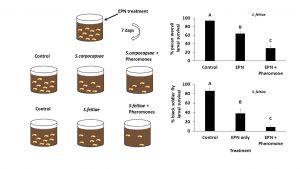 “The next step is to begin commercial production,” said Dr. Fatma Kaplan, CEO of Pheronym. “The benefits of this approach including enhanced efficacy, reduced costs and increased sustainability, are exactly the things that our agricultural customers are asking for and consumers of produce are demanding.”
“The next step is to begin commercial production,” said Dr. Fatma Kaplan, CEO of Pheronym. “The benefits of this approach including enhanced efficacy, reduced costs and increased sustainability, are exactly the things that our agricultural customers are asking for and consumers of produce are demanding.”
The publishing of this study caps off a year of milestones for Pheronym, having secured more than $1 million in grants from agencies, including the USDA-National Institute of Food and Agriculture’s Small Business Innovation Research (SBIR) Phase I and Agriculture and Food Research Initiative (AFRI) programs, and being selected to conduct the first ever agriculture bio-control experiment in space, in collaboration with USDA, aboard the International Space Station National Laboratory with a launch date scheduled for Dec. 4, 2019.
Synthetic biology investment in the midwest topped the Bay Area in Q1 by John Murray at Synbiobeta
Whether it’s Motown music or Boston biotech, innovation happens quicker in some places than others. And in synthetic biology, Boston and the Bay Area have always set the pace. The reasons are well known. Decades of smart policy decisions paved the way for today’s virtuous circle of innovation and investment. But Q1 funding for synthetic biology brought some surprises. Keep reading.
Dr. Kaplan is going to be presenting an entrepreneurial journey from Ph.D. to starting a company. Come and join me. It is at 11 AM on Friday, May 3. Room: 1022 LS
Title of her talk: I Wish I Had Known What It Takes To Start A Company When I Was A Graduate Student
By Russell Nichols at Comstock’s Magazine 2019, March 19 vol 31 No.3
Thank you Russell for this great article and the article for Startup of the Month: Pheronym.


Help Pheronym win the $50,000 FedEx Small Business Grant! Vote for us. We will use the money to bring new, sustainable, eco-friendly agricultural pest control solutions to the market.
By Russell Nichols at Comstock’s Magazine
Nematodes pose a conundrum to farmers. The worm-like microscopic creatures are everywhere. Some are parasitic, infecting plants and destroying crops — but others actually attack insect pests. The ability to target the “bad” while leaving the “good” unharmed would be a boon for agricultural production.
That’s the mission at Pheronym, a Davis-based agriculture biotech startup Keep Reading